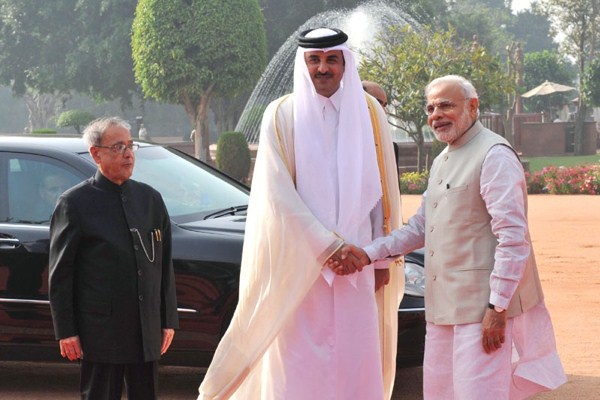In late March, Qatar’s emir, Sheikh Tamim bin Hamad Al Thani, became the first head of state from the Gulf Cooperation Council (GCC) to visit India since Prime Minister Narendra Modi took office last year. The visit came at a time when India is looking to renegotiate its long-term gas contracts with Qatar, given the opening up of other sources of supply around the world. Qatar is still India’s primary liquefied natural gas supplier and also hosts 600,000 Indian nationals, most of whom work as migrant laborers, which in recent years has led to India extending security guarantees to its Gulf partner. Yet both sides still feel the need to deepen their relationship through more diversified economic ties. Qatar is keen to invest in Modi’s “Make in India” initiative and has also invited Indian companies to build major construction projects ahead of the 2022 FIFA World Cup.
But India’s growing ties with Qatar are also part of a broader policy of Indian engagement throughout the Gulf and the wider Middle East, on issues from labor access to counterterrorism cooperation to, above all, energy security. That includes Oman, with which India has expanded naval cooperation, as well as Iran. India is the second-largest buyer of Iranian oil and is invested in a major Iranian port project in Chabahar. After the framework agreement to limit Iran’s nuclear program and amid the ongoing Saudi-led war against Houthi rebels in Yemen, India is hedging its bets against both the prospect of detente and the threat of rising instability, using diversified partnerships with Qatar and other Gulf countries to protect its interests.
Qatar currently accounts for 86 percent of all Indian liquefied natural gas imports, thanks to a deal signed between India’s Petronet LNG and Qatar’s Rasgas in 1999. That arrangement has endured in no small measure thanks to the political ties built up by Sheikh Tamim’s predecessor and father, Sheikh Hamad bin Khalifa Al Thani, who visited India three times during his reign. But Qatari dominance in India’s gas market increasingly must contend with new supply sources from offshore sites in East Africa and Australia to shale plays in the United States. Competition is growing: Prices for liquefied natural gas cargoes have dropped to half the rates that Indian importers pay to Qatar’s Rasgas on a long-term basis. While India is already exercising contractual clauses that allow a reduction of volumes, it also wants the contracts renegotiated to reflect the new realities of the global gas market, especially now that India can potentially restart its moribund gas projects with Iran.

